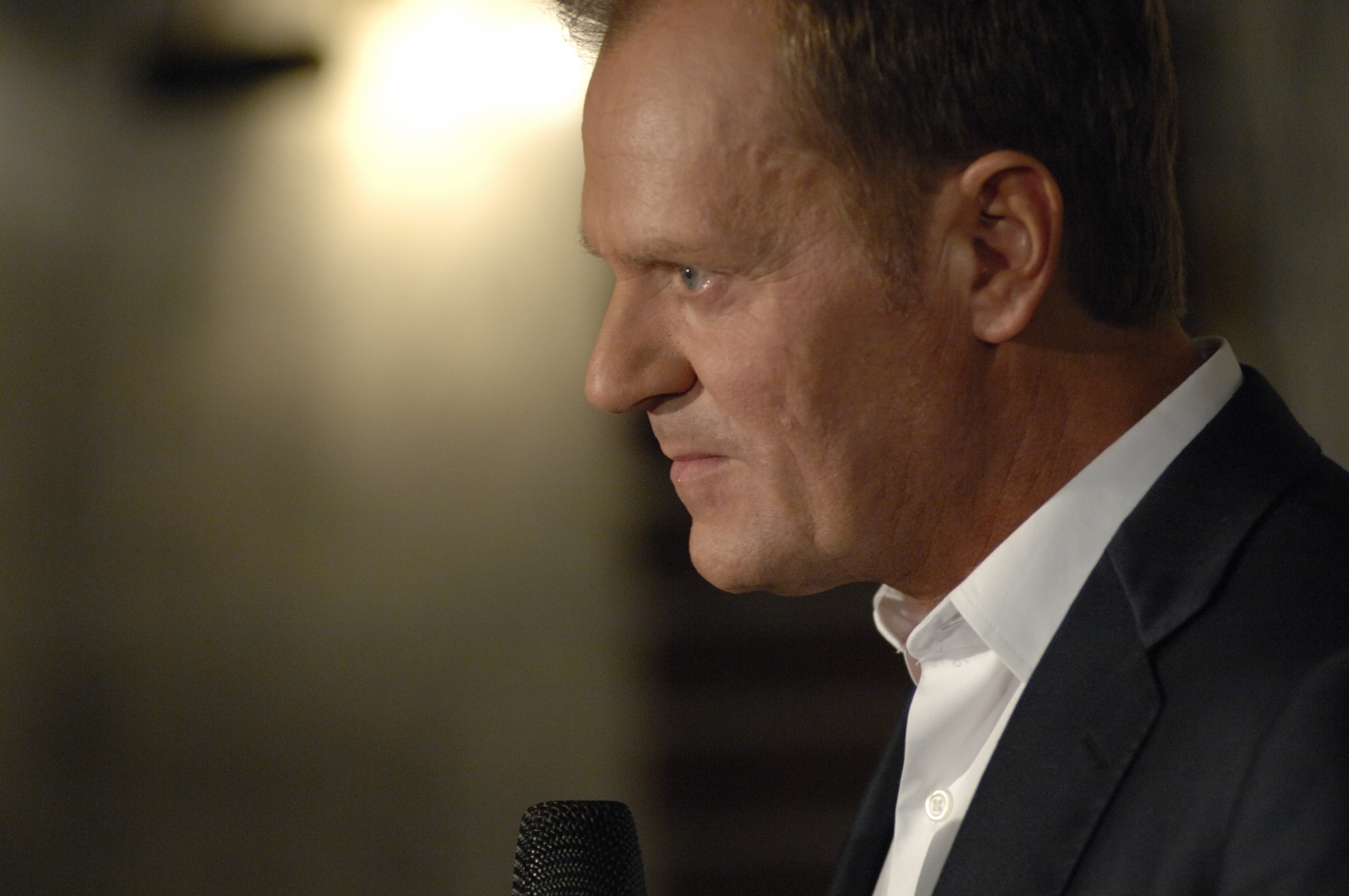Former Polish Prime Minister and current President of the European Council, Donald Tusk took a direct and very active part in reaching an agreement with Greece regarding the settlement of its debts. In particular, he presided at the summit on Monday, where managed to reach the agreement with the Greek Prime Minister Alexis Tsipras during the 17-hour negotiating parties. During the 90-minute interview with reporters of seven European newspapers, Mr. Tusk shared his thoughts on the resolution of the Greek conflict and the current political situation in Europe.
The interview started with the question of whether or not the authority of Berlin was undermined with that according to some critics, Angela Merkel pushed Greece and Alexis Tsipras, and forced them to accept the agreement on its terms. Mr. Tusk said that, that in his opinion, "the position of Germany after these negotiations has not been diminished, but not become more strong either."
- I am quite sure that this agreement between the members of the euro zone is something like a draw. There are no losers or winners, at the time the lack of enthusiasm is obvious. Nobody is satisfied. But I'm 100% sure that Germany is not a winner in the context of political power ... After all, Germany will have to sacrifice much more than other countries in terms of numbers and money, - he said.
Reporters asked Mr. Tusk about that, according to many officials, the agreement with Greece is unlikely to last long, and it only delayed Grexit. The head of the European Council said that the agreement "is not a guarantee for years", but "is only the first step in the long-term work, and now it works."
- The vote in the Greek parliament was filled with emotions, and then again, that controversial Tsipras’ promise that he is ready to support an agreement he does not believe in, - said Mr. Tusk.
- This is actually quite original. But I think it's also very honest and sincere. Because when I watched his face during the negotiations, it was quite obvious to me that he was not satisfied, and it was a really tough test for him. According to Donald Tusk, it is necessary to avoid all these discussions about the dignity, humiliation and trust to have some sort of guarantee, because "it is not a negotiation, but preparation for the battle, as it has always happened in our history." The talks, he said, should be reduced to numbers, laws, procedures. The negotiations need "more pragmatic, not political or ideological debate."
Asked what he had geopolitical concerns, the head of the European Council noted he has always been firmly convinced that Europe faces no negative financial consequences, even in the case of Greece. But the political, ideological and geopolitical consequences predicted were possible to be predicted.
- I'm not really afraid of the financial but ideological or political contagion of the Greek crisis.
According to him, there was such an atmosphere, a mood - something like a large-scale political debates in Europe.
- A sort of economic or ideological illusion that we can build some kind of alternative to the European economic system. And it is not just a Greek phenomenon. This new mood of minds, I Intuitively guess, is very dangerous for Europe. Especially the radical left the illusion that you can create some kind of alternative to the traditional vision of the European economy, - said Mr. Tusk.
The most emotional Mr. Tusk’s response was recognized an answer to a question that, as many say, Greece was simply forced to take tough economy for the country as a punishment for that it dared to question the existing order.
- I cannot accept the argument that there was someone punished in this situation, especially if that someone is Greece or Alexis Tsipras. Everything was done to help Greece ... I hear the statement, that it was humiliating and that Tsipras lose, in Brussels and in Paris and in Berlin. But this is absurd. Tsipras negotiated about getting help for his country in the amount of € 80 billion and achieved success. When discussing the facts of the case and figures, the only figure in front of us - € 80 billion of aid to Greece, and very mild conditions. Not only financial, but also political conditions, and in fact, without any collateral. So what gives reason to say that there is something humiliating for Greece, or it was a punishment for Tsipras?
In the end, the reporters asked, could it be that the negotiators for aid to Greece would have to meet in Brussels to discuss the issue even before the end of the summer.
- I cannot exclude the possibility of holding a new summit this summer - said Mr. Tusk. Still I hope that this will not happen. The vote in Athens was promising... support of Parliament was impressive, and demonstrations were not as big, visible and spectacular, but maybe this is still a breakthrough in mentality. I hope so.
The interview started with the question of whether or not the authority of Berlin was undermined with that according to some critics, Angela Merkel pushed Greece and Alexis Tsipras, and forced them to accept the agreement on its terms. Mr. Tusk said that, that in his opinion, "the position of Germany after these negotiations has not been diminished, but not become more strong either."
- I am quite sure that this agreement between the members of the euro zone is something like a draw. There are no losers or winners, at the time the lack of enthusiasm is obvious. Nobody is satisfied. But I'm 100% sure that Germany is not a winner in the context of political power ... After all, Germany will have to sacrifice much more than other countries in terms of numbers and money, - he said.
Reporters asked Mr. Tusk about that, according to many officials, the agreement with Greece is unlikely to last long, and it only delayed Grexit. The head of the European Council said that the agreement "is not a guarantee for years", but "is only the first step in the long-term work, and now it works."
- The vote in the Greek parliament was filled with emotions, and then again, that controversial Tsipras’ promise that he is ready to support an agreement he does not believe in, - said Mr. Tusk.
- This is actually quite original. But I think it's also very honest and sincere. Because when I watched his face during the negotiations, it was quite obvious to me that he was not satisfied, and it was a really tough test for him. According to Donald Tusk, it is necessary to avoid all these discussions about the dignity, humiliation and trust to have some sort of guarantee, because "it is not a negotiation, but preparation for the battle, as it has always happened in our history." The talks, he said, should be reduced to numbers, laws, procedures. The negotiations need "more pragmatic, not political or ideological debate."
Asked what he had geopolitical concerns, the head of the European Council noted he has always been firmly convinced that Europe faces no negative financial consequences, even in the case of Greece. But the political, ideological and geopolitical consequences predicted were possible to be predicted.
- I'm not really afraid of the financial but ideological or political contagion of the Greek crisis.
According to him, there was such an atmosphere, a mood - something like a large-scale political debates in Europe.
- A sort of economic or ideological illusion that we can build some kind of alternative to the European economic system. And it is not just a Greek phenomenon. This new mood of minds, I Intuitively guess, is very dangerous for Europe. Especially the radical left the illusion that you can create some kind of alternative to the traditional vision of the European economy, - said Mr. Tusk.
The most emotional Mr. Tusk’s response was recognized an answer to a question that, as many say, Greece was simply forced to take tough economy for the country as a punishment for that it dared to question the existing order.
- I cannot accept the argument that there was someone punished in this situation, especially if that someone is Greece or Alexis Tsipras. Everything was done to help Greece ... I hear the statement, that it was humiliating and that Tsipras lose, in Brussels and in Paris and in Berlin. But this is absurd. Tsipras negotiated about getting help for his country in the amount of € 80 billion and achieved success. When discussing the facts of the case and figures, the only figure in front of us - € 80 billion of aid to Greece, and very mild conditions. Not only financial, but also political conditions, and in fact, without any collateral. So what gives reason to say that there is something humiliating for Greece, or it was a punishment for Tsipras?
In the end, the reporters asked, could it be that the negotiators for aid to Greece would have to meet in Brussels to discuss the issue even before the end of the summer.
- I cannot exclude the possibility of holding a new summit this summer - said Mr. Tusk. Still I hope that this will not happen. The vote in Athens was promising... support of Parliament was impressive, and demonstrations were not as big, visible and spectacular, but maybe this is still a breakthrough in mentality. I hope so.



















